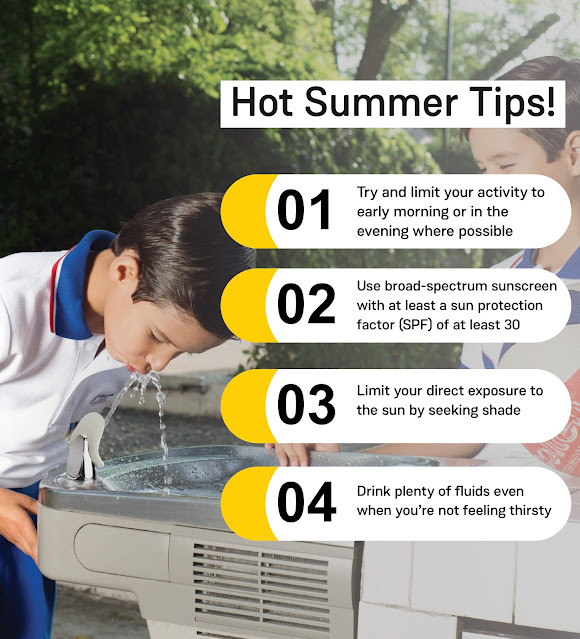Staying safe and healthy during hot weather is important to prevent heat-related illnesses such as heat exhaustion and heat stroke. Here are some tips to stay safe and healthy in hot weather:
1.Stay hydrated: Drink plenty of water and fluids throughout the day, even if you do not feel thirsty. Avoid alcoholic and caffeinated beverages as they can increase dehydration. Water is the best choice for staying hydrated.
2.Dress appropriately: Wear loose, light-colored, and lightweight clothing made of breathable fabrics such as cotton to allow sweat to evaporate and cool your body. Avoid dark-colored clothing and heavy fabrics that can trap heat.
3.Seek shade: Stay in shaded areas as much as possible during the hottest times of the day, typically between 10 a.m. and 4 p.m. If you are outdoors, use umbrellas, wide-brimmed hats, and sunglasses to protect yourself from direct sunlight.
4.Apply sunscreen: Apply a broad-spectrum sunscreen with a high SPF (sun protection factor) to protect your skin from harmful UV rays. Reapply every two hours or after swimming or sweating.
5.Take cool showers or baths: Taking cool showers or baths can help lower your body temperature and provide relief from the heat.
6.Use fans and/or air conditioning: Use fans and/or air conditioning to cool your living spaces. If you do not have air conditioning at home, spend time in air-conditioned public places such as shopping malls, libraries, or community centers.
7.Rest and take breaks: Avoid excessive physical activity during the hottest times of the day, and take regular breaks if you are working or exercising outdoors. Listen to your body and rest when you feel tired or overheated.
8.Eat light, balanced meals: Opt for light, easy-to-digest meals that are rich in fruits and vegetables. Avoid heavy, high-protein meals that can increase metabolic heat production and make you feel hotter.
9.Check on vulnerable individuals: Keep an eye on infants, elderly individuals, those with chronic medical conditions, and pets, as they may be more susceptible to heat-related illnesses. Offer assistance and make sure they are staying hydrated and cool.
10.Know the signs of heat-related illnesses: Familiarize yourself with the symptoms of heat exhaustion (such as heavy sweating, weakness, nausea, dizziness, headache, and muscle cramps) and heat stroke (such as high body temperature, hot and dry skin, confusion, rapid pulse, and loss of consciousness). If you or someone else experiences these symptoms, seek immediate medical attention.
By following these tips, you can stay safe and healthy during hot weather and prevent heat-related illnesses. Stay hydrated, seek shade, dress appropriately, use fans or air conditioning, take breaks, and pay attention to your body's signals. If you experience severe symptoms or suspect heat-related illness, seek medical attention promptly.
Here are some additional tips to stay safe and healthy in hot weather:
11.Be mindful of your medications: Some medications can increase your sensitivity to heat or impair your body's ability to regulate temperature. If you are taking any medications, especially those that affect your heart, blood pressure, or diuretics, consult with your healthcare provider to see if any adjustments need to be made during hot weather.
12.Avoid hot cars: Never leave children, pets, or anyone else in a parked car, even for a short period of time. The temperature inside a parked car can rise rapidly and reach dangerous levels, even with the windows cracked.
13.Use cool, damp towels or take cool baths: Applying cool, damp towels on your skin or taking cool baths can help bring down your body temperature and provide relief from the heat.
14.Plan outdoor activities wisely: If you need to be outdoors during hot weather, schedule outdoor activities during the cooler times of the day, such as early morning or late evening. Take frequent breaks in shaded areas and avoid prolonged exposure to direct sunlight.
15.Use appropriate outdoor gear: Wear a wide-brimmed hat, sunglasses, and use an umbrella or a sunshade to protect yourself from the sun's rays when you are outdoors. Use a misting spray bottle or a handheld fan to help cool yourself down.
16.Pay attention to your body: Listen to your body and pay attention to any signs of overheating, such as feeling overly fatigued, dizzy, or experiencing cramps. Take immediate action to cool down if you start feeling unwell.
17.Stay informed about weather conditions: Stay updated with the latest weather forecast and heat advisories in your area. Follow advice from local authorities and take necessary precautions accordingly.
18.Stay in touch with others: Stay in touch with family, friends, and neighbors, especially those who may be more vulnerable to heat-related illnesses, and check on each other regularly.
19.Create a cool indoor environment: Use fans or air conditioning to create a cool indoor environment. Keep windows and doors closed during the hottest times of the day to prevent hot air from entering your living spaces.
20.Know emergency protocols: Familiarize yourself with emergency protocols for heat-related illnesses and know what to do in case of a heat-related emergency, including when to call emergency services.
Remember, extreme heat can be dangerous, and it's important to take necessary precautions to stay safe and healthy. Stay hydrated, dress appropriately, seek shade, use fans or air conditioning, take breaks, and be mindful of your body's signals. Stay informed about weather conditions and know emergency protocols. If you experience severe symptoms of heat-related illness, seek medical attention immediately.
Thanks ! for visit and read about.










0 Comments